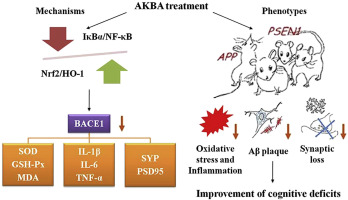当前位置:
X-MOL 学术
›
Free Radical Bio. Med.
›
论文详情
Our official English website, www.x-mol.net, welcomes your
feedback! (Note: you will need to create a separate account there.)
Acetyl-11-keto-β-boswellic acid ameliorates cognitive deficits and reduces amyloid-β levels in APPswe/PS1dE9 mice through antioxidant and anti-inflammatory pathways.
Free Radical Biology and Medicine ( IF 7.1 ) Pub Date : 2020-02-25 , DOI: 10.1016/j.freeradbiomed.2020.02.022 Chao Wei 1 , Jiao Fan 2 , Xuan Sun 1 , Jiarui Yao 1 , Yane Guo 1 , Bo Zhou 1 , Yanchang Shang 1
Free Radical Biology and Medicine ( IF 7.1 ) Pub Date : 2020-02-25 , DOI: 10.1016/j.freeradbiomed.2020.02.022 Chao Wei 1 , Jiao Fan 2 , Xuan Sun 1 , Jiarui Yao 1 , Yane Guo 1 , Bo Zhou 1 , Yanchang Shang 1
Affiliation

|
Alzheimer's disease (AD) is a complex disease involved oxidative stress and inflammation in its pathogenesis. Acetyl-11-keto-β-boswellic acid (AKBA) is an active triterpenoid compound from extracts of Boswellia serrata, which has been widely used as an antioxidant and anti-inflammatory agent. The present study was to determine whether AKBA, a novel candidate, could protect against cognitive and neuropathological impairments in AD. We found that AKBA treatment resulted in a significant improvement of learning and memory deficits, a dramatic decrease in cerebral amyloid-β (Aβ) levels and plaque burden, a profound alleviation in oxidative stress and inflammation, and a marked reduction in activated glial cells and synaptic defects in the APPswe/PS1dE9 mice. Furthermore, amyloid precursor protein (APP) processing was remarkably suppressed with AKBA treatment by inhibiting beta-site APP cleaving enzyme 1 (BACE1) protein expression to produce Aβ in the APPswe/PS1dE9 mice brains. Mechanistically, AKBA modulated antioxidant and anti-inflammatory pathways via increasing nuclear erythroid 2-related factor 2 (Nrf2) and heme oxygenase-1 (HO-1) expression, and via declining phosphorylation of inhibitor of nuclear factor-kappa B alpha (IκBα) and p65. Collectively, our findings provide evidence that AKBA protects neurons against oxidative stress and inflammation in AD, and this neuroprotective effect involves the Nrf2/HO-1 and nuclear factor-kappa B (NF-κB) signaling pathways.
中文翻译:

乙酰基-11-酮基-β-乳香酸可通过抗氧化剂和抗炎途径改善APPswe / PS1dE9小鼠的认知缺陷并降低淀粉样β的水平。
阿尔茨海默氏病(AD)是一种复杂的疾病,其发病机理涉及氧化应激和炎症。乙酰基-11-酮基-β-乳香酸(AKBA)是从乳香(Boswellia serrata)提取物中提取的活性三萜类化合物,已被广泛用作抗氧化剂和消炎剂。本研究旨在确定新型候选药物AKBA是否可以预防AD的认知和神经病理损害。我们发现AKBA治疗可显着改善学习和记忆障碍,显着降低脑淀粉样β(Aβ)水平和噬菌斑负担,显着减轻氧化应激和炎症,并显着减少活化的神经胶质细胞和APPswe / PS1dE9小鼠中的突触缺陷。此外,通过抑制β-位APP裂解酶1(BACE1)蛋白表达以在APPswe / PS1dE9小鼠大脑中产生Aβ,AKBA处理显着抑制了淀粉样前体蛋白(APP)的加工。从机制上讲,AKBA通过增加核红系2相关因子2(Nrf2)和血红素加氧酶1(HO-1)的表达,以及通过降低核因子-κBα(IκBα)抑制剂的磷酸化来调节抗氧化剂和抗炎途径。和p65。总的来说,我们的发现提供了证据,即AKBA保护神经元抵抗AD中的氧化应激和炎症,并且这种神经保护作用涉及Nrf2 / HO-1和核因子-κB(NF-κB)信号通路。AKBA通过增加核红系2相关因子2(Nrf2)和血红素加氧酶1(HO-1)的表达,以及通过减少核因子-κBα(IκBα)和p65抑制剂的磷酸化来调节抗氧化剂和抗炎途径。 。总的来说,我们的发现提供了证据,即AKBA保护神经元抵抗AD中的氧化应激和炎症,并且这种神经保护作用涉及Nrf2 / HO-1和核因子-κB(NF-κB)信号通路。AKBA通过增加核红系2相关因子2(Nrf2)和血红素加氧酶1(HO-1)的表达,以及通过减少核因子-κBα(IκBα)和p65抑制剂的磷酸化来调节抗氧化剂和抗炎途径。 。总的来说,我们的发现提供了证据,即AKBA保护神经元抵抗AD中的氧化应激和炎症,并且这种神经保护作用涉及Nrf2 / HO-1和核因子-κB(NF-κB)信号通路。
更新日期:2020-02-25
中文翻译:

乙酰基-11-酮基-β-乳香酸可通过抗氧化剂和抗炎途径改善APPswe / PS1dE9小鼠的认知缺陷并降低淀粉样β的水平。
阿尔茨海默氏病(AD)是一种复杂的疾病,其发病机理涉及氧化应激和炎症。乙酰基-11-酮基-β-乳香酸(AKBA)是从乳香(Boswellia serrata)提取物中提取的活性三萜类化合物,已被广泛用作抗氧化剂和消炎剂。本研究旨在确定新型候选药物AKBA是否可以预防AD的认知和神经病理损害。我们发现AKBA治疗可显着改善学习和记忆障碍,显着降低脑淀粉样β(Aβ)水平和噬菌斑负担,显着减轻氧化应激和炎症,并显着减少活化的神经胶质细胞和APPswe / PS1dE9小鼠中的突触缺陷。此外,通过抑制β-位APP裂解酶1(BACE1)蛋白表达以在APPswe / PS1dE9小鼠大脑中产生Aβ,AKBA处理显着抑制了淀粉样前体蛋白(APP)的加工。从机制上讲,AKBA通过增加核红系2相关因子2(Nrf2)和血红素加氧酶1(HO-1)的表达,以及通过降低核因子-κBα(IκBα)抑制剂的磷酸化来调节抗氧化剂和抗炎途径。和p65。总的来说,我们的发现提供了证据,即AKBA保护神经元抵抗AD中的氧化应激和炎症,并且这种神经保护作用涉及Nrf2 / HO-1和核因子-κB(NF-κB)信号通路。AKBA通过增加核红系2相关因子2(Nrf2)和血红素加氧酶1(HO-1)的表达,以及通过减少核因子-κBα(IκBα)和p65抑制剂的磷酸化来调节抗氧化剂和抗炎途径。 。总的来说,我们的发现提供了证据,即AKBA保护神经元抵抗AD中的氧化应激和炎症,并且这种神经保护作用涉及Nrf2 / HO-1和核因子-κB(NF-κB)信号通路。AKBA通过增加核红系2相关因子2(Nrf2)和血红素加氧酶1(HO-1)的表达,以及通过减少核因子-κBα(IκBα)和p65抑制剂的磷酸化来调节抗氧化剂和抗炎途径。 。总的来说,我们的发现提供了证据,即AKBA保护神经元抵抗AD中的氧化应激和炎症,并且这种神经保护作用涉及Nrf2 / HO-1和核因子-κB(NF-κB)信号通路。











































 京公网安备 11010802027423号
京公网安备 11010802027423号